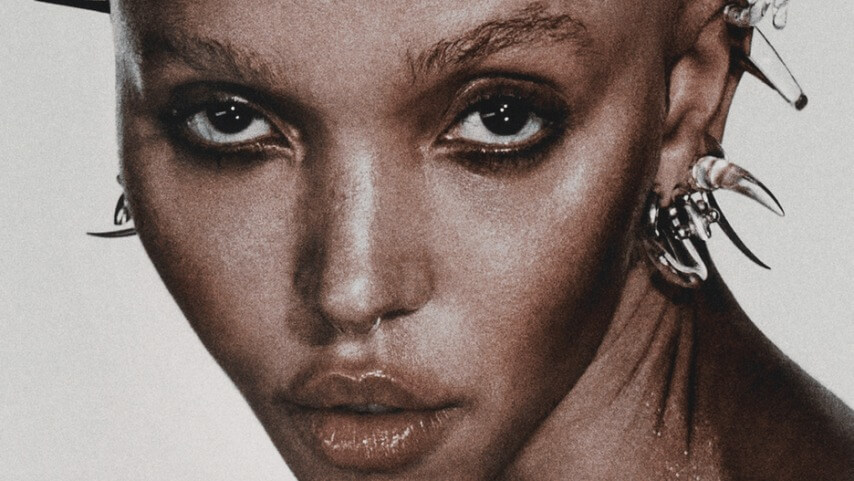FKA twigs' Eusexua is a-little-too-safe sex
The singer’s third official album often sounds great and is undeniably polished, but it could use a little more sweat.
Image: FKA twigs, Eusexua (Young/Atlantic Records)
Last year, FKA twigs testified before Congress about the threat of Artificial Intelligence. She was interested in the technology, she explained, but wanted to ensure it was used in a way that gave credit to artists and that individuals and companies could not use her work and likeness without her consent. This is not a particularly novel stance; other tech-savvy artists like Grimes and Imogen Heap have also embraced AI. But what was new was twigs’ reveal that she had already created a deepfake of herself and was experimenting with using it for some of her social media and press obligations, giving her more time in the studio. FKA twigs correctly identifies consent as a primary difference between these two ventures, but believes there is an appropriate time and place to swap in an imitation. There are practical benefits to a splintered identity, and there is a time and a place for the real you.
This is the milieu that birthed Eusexua, the latest full-length project from the pop star born Tahliah Bennett. The goal of the album is to share both a high-minded concept and, perhaps more importantly, a call for people to move their physical bodies, ideally with other people. “Eusexua,” as twigs defined it for Vogue last year, is a meditative physical experience, a loss of time in the club, and a moment of absolute clarity. The bodies in the club are moving together, turning a group of people—strangers, really—into a single organism. The way to do this is not with words but with music and rhythm, but Eusexua is often more suited for a pair of AirPods than a dark, sweaty dance floor.
The immediate point of reference here is Madonna’s Ray Of Light and the late-1990s trip hop it has come to epitomize. “Girl Feels Good,” one of the funkier tracks here, could slot easily into Madonna’s enlightenment-on-the-dance-floor album. That album was “drug music without drugs,” as Madonna said at the time; it was essentially clean and celebrated new life. (The singer’s daughter, Lourdes, was born a year and a half before Ray Of Light.) But Eusexua has dirtier aspirations. The topics on twigs’ mind are immediate; you’re hard-pressed to find lyrics concerned with something she can’t see, feel, or hear in that moment. “Words cannot describe baby/This feeling deep inside,” twigs sings mere seconds into the album. Language, like individual bodies, is to be transcended, and the music must facilitate that.
But Eusexua is not always up to the task. The percussion on “Drums Of Death,” the anchor for the glitching brain, sounds ceremonial, even polite. What’s killed here is the ego; twigs wants to shed her skin, “crash the system diva doll, serve cunt, serve violence.” That sounds a lot more fun than what the stuttering beat, which comes from frequent collaborator Koreless and K-Pop mainstays G-Dragon and Choice37, ultimately delivers. But there are grander moments; despite cliché horoscope nods, it’s easy to lose yourself in the pulsing “Perfect Stranger.” “Room Of Fools,” though lyrically revisiting the idea of a “stranger in a dark room,” contains shades of SOPHIE as it builds toward one of Eusexua’s more effective climaxes. It’s a shame there isn’t more time to luxuriate in these beats, especially when they do reach toward the promise of the post-human.
Sweat is rare here, which is disappointing, given Eusexua‘s dance-floor aspirations. Still, twigs’ work has long sounded polished and precise. Her last full-length album, 2019’s Magdalene, adapted her delicate, intricate vocal work to madrigal melodies. Her pure, icy voice can express the feeling where words fail, as in “Sticky,” Eusexua’s most vulnerable moment. “I tried to fuck you with the lights on, in the hope you’d think I’m open and have a conversation,” she confesses before the track ends with an audio trainwreck (complimentary). Vulnerability is scary, and the dancefloor is not always a respite from danger. This is soon followed with “Childlike Things,” a laugh-out-loud regression by way of J-pop that sounds AirDropped from another project. It’s wacky and out of place, but perhaps the least self-conscious moment on the album.
Because while Eusexua is undeniably a well-assembled pop album, it’s one that would have benefitted from a bit more fun, a bit more mess. It’s an album about surrender but filtered through a single individual, forward-gesturing but incredibly of the moment. The future never actually arrives, one moment only fades into the next. twigs’ mission here is to assemble all of these pieces into a cohesive whole, and she does just that. But you might wish there were a few more rough edges at the end.